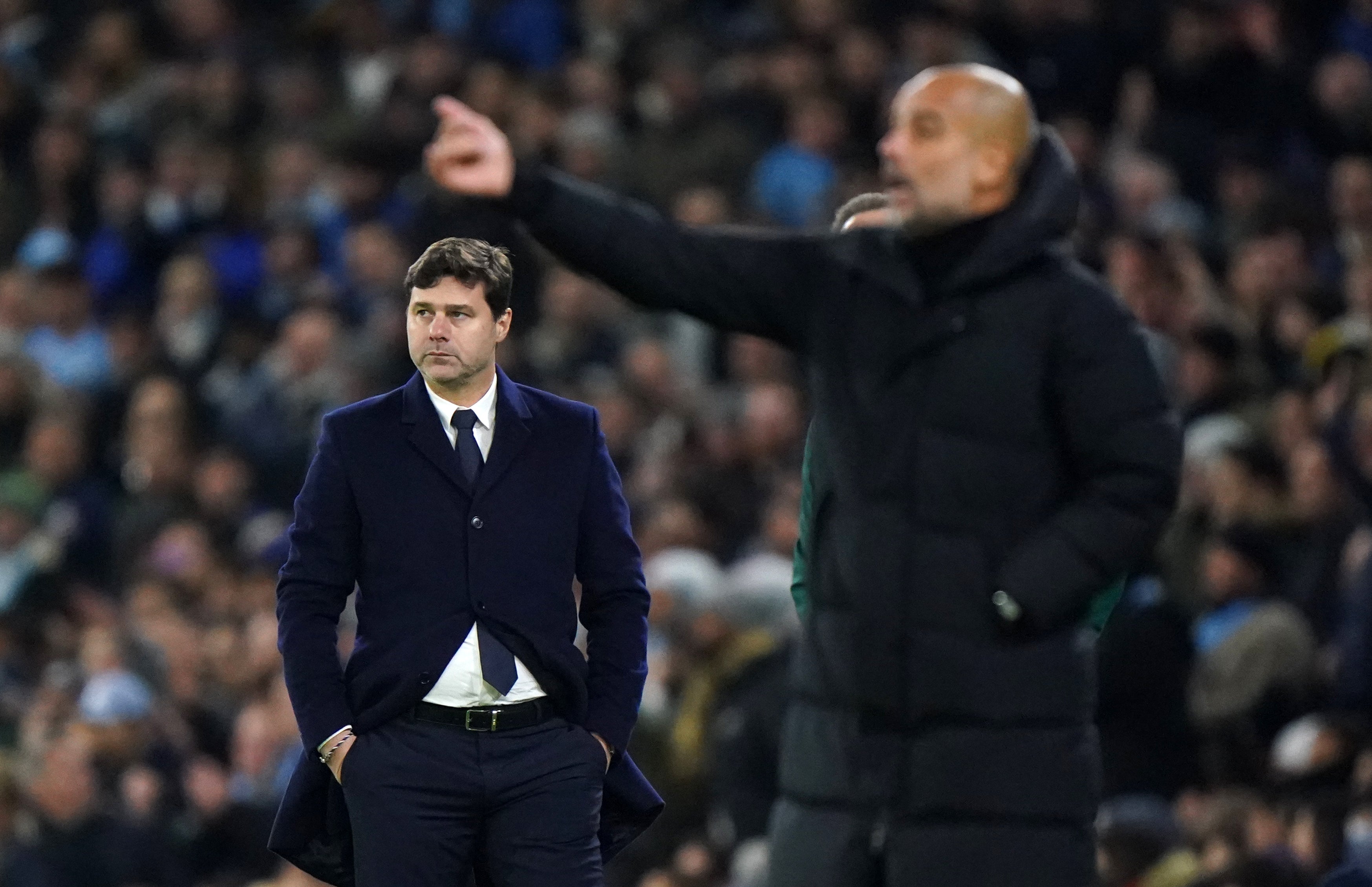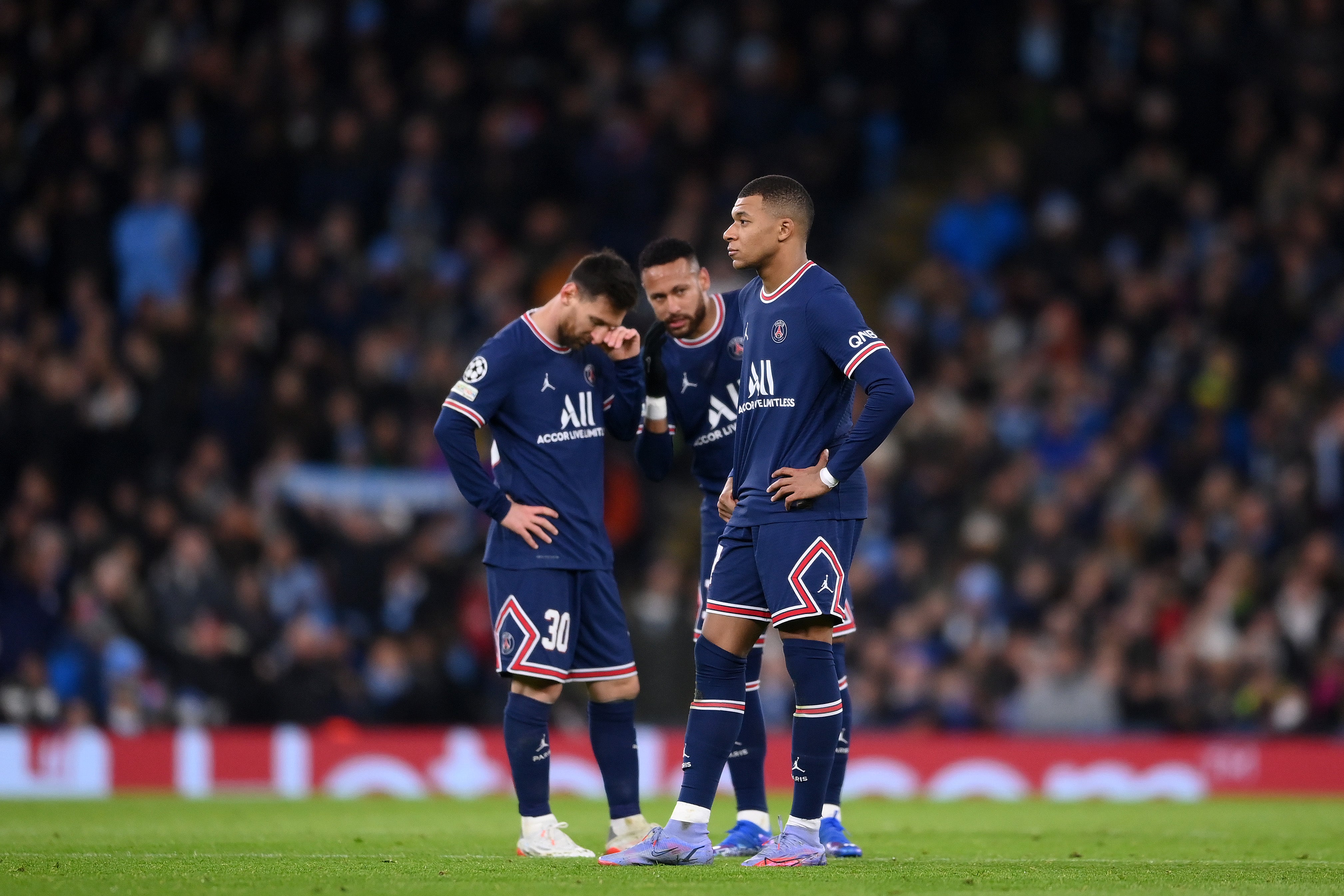Pep Guardiola has what Mauricio Pochettino can never have at Paris Saint-Germain: a team built in his image
The PSG boss is heavily linked with the cross-city rivals of the team which beat him on Wednesday, and there he perhaps could shape a side to suit his needs

Your support helps us to tell the story
From reproductive rights to climate change to Big Tech, The Independent is on the ground when the story is developing. Whether it's investigating the financials of Elon Musk's pro-Trump PAC or producing our latest documentary, 'The A Word', which shines a light on the American women fighting for reproductive rights, we know how important it is to parse out the facts from the messaging.
At such a critical moment in US history, we need reporters on the ground. Your donation allows us to keep sending journalists to speak to both sides of the story.
The Independent is trusted by Americans across the entire political spectrum. And unlike many other quality news outlets, we choose not to lock Americans out of our reporting and analysis with paywalls. We believe quality journalism should be available to everyone, paid for by those who can afford it.
Your support makes all the difference.Why would Mauricio Pochettino ever want to leave Paris Saint-Germain? He has the players, he has the resources, he has a commensurate pay packet, which he could spend on all the Argentinian steak and energy crystals you can buy in one of the most beautiful cities in the world. Why would you even entertain going elsewhere? Well, perhaps the reason is simple. Perhaps it is because he does not have the team.
He has a team, one assembled at an extortionate cost, and in fairness they are presently 11 points clear at the top of Ligue 1. Pochettino should finally deliver the first domestic league title of his managerial career if he sees it out to the end of the campaign. And unless there is any significant change of heart on the part of his paymasters, a mid-season departure for Old Trafford seems unlikely.
But does he have the team? And by that, we do not mean a collection of superstars that teenage boys might pull together when splurging their parents’ savings in a FIFA multiplayer mode, but the type of hard-working, hard running, hard-to-beat team that Pochettino would ideally build?
That was the question you were left asking when the final whistle sounded on the fourth instalment of El Gasico this calendar year. As for all the similarities between these rival members of football’s nouveau riche powered by petrocarbon empires, their approaches to world domination are remarkably different.
In the sky blue corner at the Etihad, there was a club that spent several uncertain years reshaping and restructuring itself internally, all to accommodate its ideal manager, without any guarantee that he would eventually join. It was a risk but it was a calculated one, executed according to a specific philosophy, with many multi-million pound signings but no single pay-out that threatened to break records.

Meanwhile in a deeper shade of blue, there was another club that had taken another route, still spending across the squad to bring it up to the level of Europe’s legacy elite, but spending even more excessively on the finest individual attacking talents in world football. Rather than centre their project around a manager, the playing talent has the gravitational pull. The manager must adapt his methods to it.
This would not be a problem if the manager in question was a blank slate on which the supreme ability of his players could be projected, the dressing room motivator model that is easily derided yet can prove successful. That is not Pochettino, though. If there is a defining characteristic to his coaching and his success prior to joining Paris Saint-Germain, it is diligent work out of possession, with energy and intensity high up the pitch, which in turn creates chances.
There is not only one way to play, of course, but there is one way that the elite of European football tend to play and one way that Pochettino would prefer. It is his misfortune that, as wonderful as Lionel Messi, Neymar and Kylian Mbappé are, they do not particularly care for pressing. On the other side of Manchester, we have seen the difficulties that can be caused by one player not working off-the-ball this season. Now imagine if three players didn’t.
There was a moment towards the end of the first half, during a long spell of relentless Manchester City pressure which somehow did not break the deadlock, that Messi, Neymar and Mbappé were crowded together around the edge of the centre circle inside their own half. They were merely three extra spectators, joining the other 52,000 around the Etihad in watching the desperate attempts of their eight team-mates to keep Pep Guardiola’s side out.
Later, Messi, Neymar and Mbappé emerged from the players’ tunnel for the second half together, behind and separate from the rest of their team-mates. If you wanted an image of what people mean when they call this Paris Saint-Germain a ‘broken’ team, that was it. The thing about this broken team, though, is that it can be fixed quite suddenly, so expensive are the high-end parts.
Mbappé’s goal at the start of the second half was a rip in the otherwise consistent pattern of this game, entirely against the run of play. It momentarily appeared as though this unique 7-3 formation may get the better of City again, just as it did during that undeserved defeat in Paris in September. Yet such was the lack of any pressure on their play, City were gradually able to regain their composure, stream forward once more and ratchet up a pressure of their own.
You do not need to seek out the goals City scored to turn this game around and win it. You have seen them before. Both Raheem Sterling and Gabriel Jesus’ strikes were the type that Guardiola’s players regularly put past mid-table and bottom half Premier League visitors on this ground: picture a switch of play, a cut-back from the byline, then a simple close-range finish. That is the most Guardiola of goals possible, one that these players could execute in their sleep.
There was no such cohesion from their visitors. If you wanted to be generous, you could claim those specific patterns and repetitions will take time. Pochettino has been at the Parc des Princes for less than a year. His Tottenham - and it was most certainly his Tottenham - were not a particularly effective pressing team drilled in how to play out of possession at the same stage of his tenure in north London. Then again, the likes of Nacer Chadli, Andros Townsend and Benjamin Stambouli learned they couldn’t afford not to be.
That isn’t likely to be the case with Messi, Neymar and Mbappé. They are three of the finest players in Europe and may one day be remembered as the most talented attacking triumvirate to ever grace the same pitch. Though if so, you can be confident that it will be on their terms. At full time, you would not be surprised if there was a little envious glance from Pochettino across the technical area, for Guardiola has at City what he will never have in Paris: a team built in his image.
Join our commenting forum
Join thought-provoking conversations, follow other Independent readers and see their replies
Comments